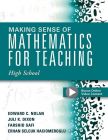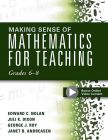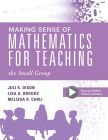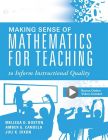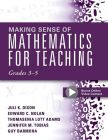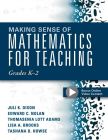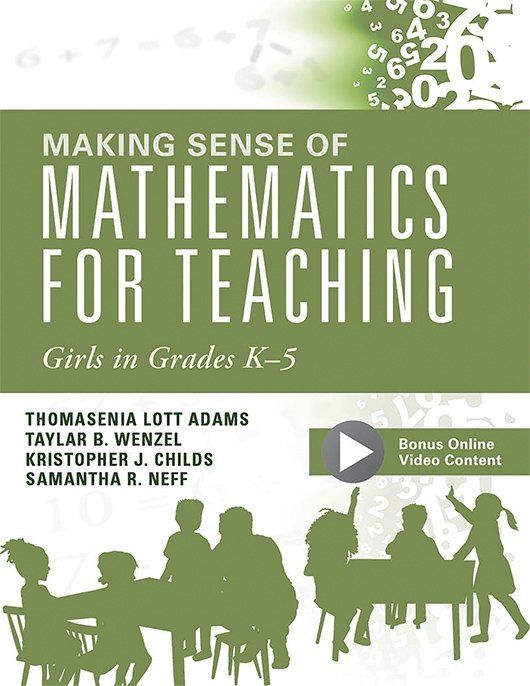
Making Sense of Mathematics for Teaching Girls in Grades K–5
Close the gender gap in mathematics. Acquire tools, tips, short exercises, and reflection questions that will help you understand the math and gender stereotypes impacting girls’ education and eliminate gender bias through effective elementary school math instruction.
Address Gender Bias in Elementary Education
Close the gender gap in mathematics across K–5 classrooms. In Making Sense of Mathematics for Teaching Girls in Grades K–5, a team of acclaimed experts presents their research and recommendations for teaching math to girls in four succinct, results-focused chapters. Included are a variety of tools, tips, short exercises, and reflection questions, as well as videos demonstrating how real classroom teachers strengthen girls’ experiences as learners of mathematics.
Use this book to better understand gender biases related to mathematics and improve girls’ education:
- Understand the environmental barriers and gender stereotypes that create gender differences in mathematics performance and prevent many girls from learning mathematics at high levels.
- Learn how to foster a safe learning environment that encourages girls to take risks when they learn math.
- Focus on the mathematics gender achievement gap through three lenses: (1) perceptions, (2) possibilities, and (3) priorities.
- Apply the tasks, questions, and evidence (TQE) process to successfully plan and implement inclusive lessons that engage all students.
- Watch short videos of girls engaging meaningfully in mathematics learning.
Related Topics
Additional Information
“I highly recommend Making Sense of Mathematics for Teaching Girls in Grades K–5 for all mathematics teachers, instructional leaders, and administrators as a guide to enacting strategies advocating for and empowering each and every girl to rightfully position mathematics as a subject they are excited about, engage in with confidence, are unafraid to take risks in and ask questions about, develop literacy for, appreciate the beauty of, and see endless possibilities for. With a valuable collection of practical and reproducible tools, this book is a must-have as we work to prepare each and every student for their bright futures!”
“In this invaluable book, Adams, Wenzel, Childs, and Neff provide specific instructional actions teachers and leaders can take to improve the classroom experiences of girls, cultivate female students’ positive mathematical identity, and empower girls to learn, do, and use mathematics. This book will challenge both your beliefs and practices. I highly recommend it to anyone who cares about reaching each and every student."
“I hear some people remark, ‘Girls’ math gap? Isn’t that all taken care of now?’ Actually, the discrepancies still exist, as revealed in the powerful research base presented in this new book from Adams, Wenzel, Childs, and Neff. Using thoughtful ways to think about change, the authors address the issue via research-informed practical approaches for teachers that delve into helping girls reduce math anxiety, stimulate STEM career interest, build confidence, energize engagement, and experience relevant role models.
Through a multifaceted process emphasizing three Ps: perceptions, possibilities, and priorities, the authors use ‘Do Nows,’ classroom videos, and reflection opportunities to unearth a variety of misconceptions and engage teachers in ways to make genuine change. The gap may still exist today, but Making Sense of Mathematics for Teaching Girls in Grades K–5 is an impressive leap in the right direction."
When can I access my eBook? Your eBook will be accessible through VitalSource once your payment has been processed.*
*When using a check or purchase order, the order submitted online will not be processed until Solution Tree receives the check or a copy of the signed official purchase order. Your purchase order must note payment terms of net 30 days. We cannot process purchase orders that do not note these payment terms. Please submit all payments to [email protected].
How do I access my eBook?
To access your eBook:
- Create a free VitalSource account by visiting VitalSource.com. If you already have a VitalSource account, please log in to your account.
- Paste the redemption code that Solution Tree will email you in the “Redemption Code” field on VitalSource.com/Redeem. (Note: You can also access your redemption code within your Solution Tree account under the “eBook” section.)
- Click “Redeem.”
- Enjoy! Once your code is redeemed, your book will be added to your VitalSource Bookshelf and can be read anytime, anywhere.
What are the technical requirements for accessing the eBook? A VitalSource account is required. To sign up for your free account, please visit VitalSource.com.
What if I have trouble accessing my eBook? Please contact VitalSource by emailing [email protected] or by utilizing their Live Chat feature.
What are the shipping and handling costs? There are no shipping or handling costs associated with eBooks. For paperback and hardcover book purchases, standard shipping costs apply. Please visit the Product Orders page for more information on shipping and handling costs.
Can I purchase multiple copies of the same eBook? Bulk orders are not currently available through the website. Website purchases are limited to one eBook per title, per account. If you want to order multiple copies of an eBook, please contact customer support at [email protected].
What if I need to request a refund on my eBook order? RETURN POLICY: We are unable to accept returns or cancel previously placed eBook orders.

